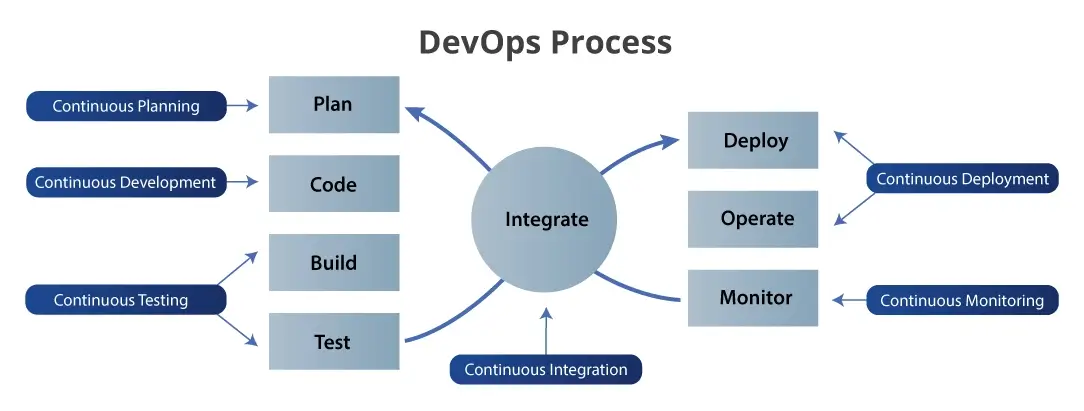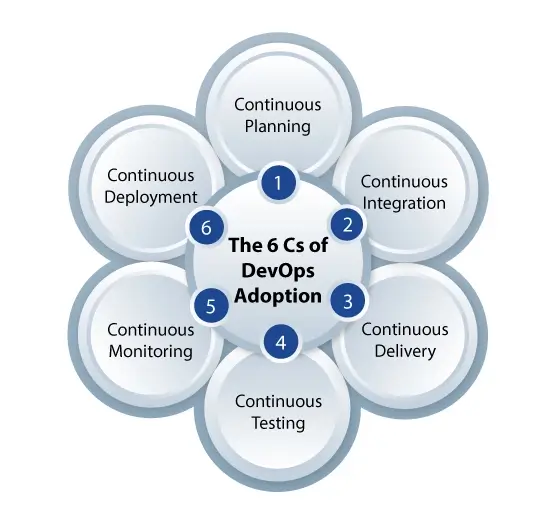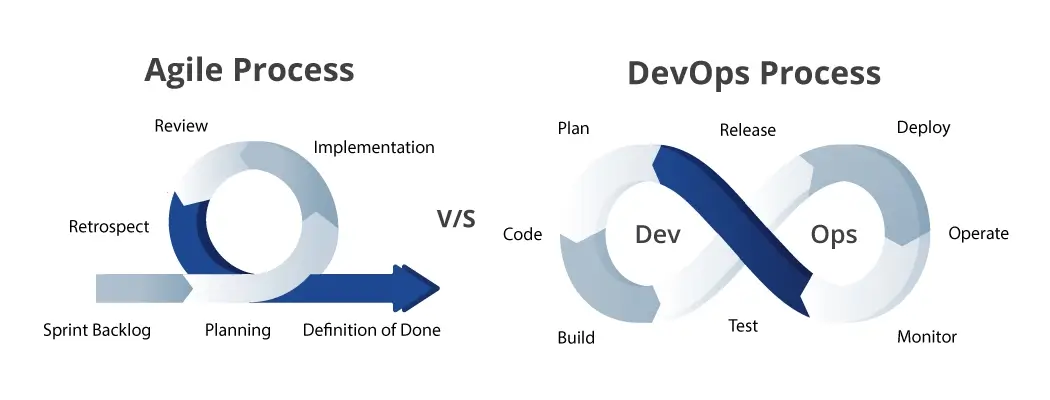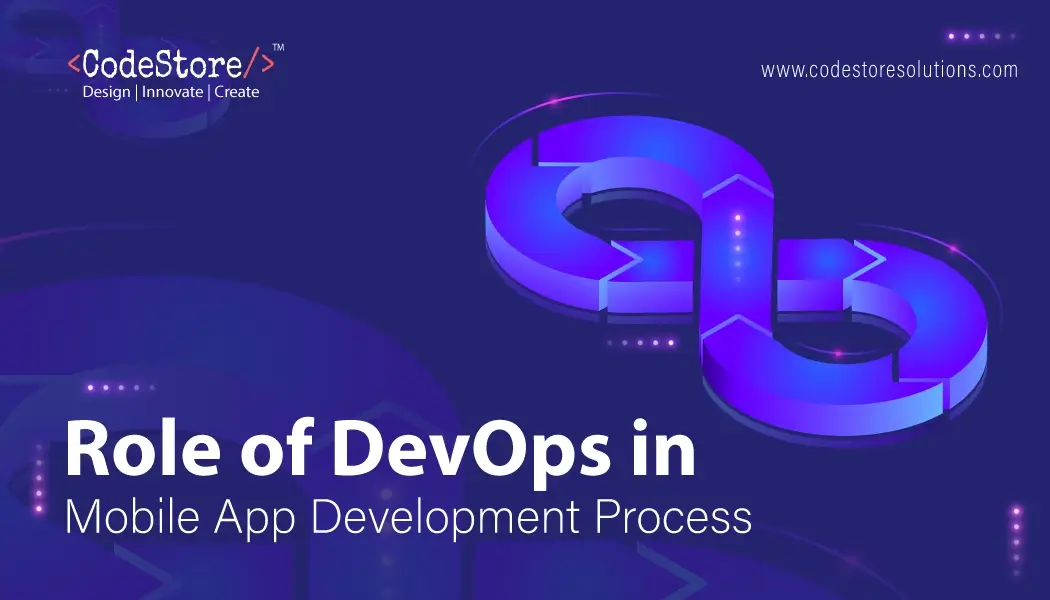Introduction
For the last few years, millions of people around the globe have been using mobile devices as the major source of accessing the internet. This is the main reason most organizations have developed their mobile application for doing business. During this phase, the IT industry mainly focused on fulfilling the market demands and they focused their businesses completely on making existence in the tech market. However, they ignored to concentrate on app security, quality of code, maintainability, and the cost of development; these are some of the main aspects of the mobile app development process. Now, this is high time, they must focus on fixing such issues and accept the new techniques to enhance their quality and reduce the risks. This is where DevOps plays the role of a game-changer.
DevOps for mobile app development is a completely modern approach that enables seamless application delivery from inception to production. The most exciting thing about DevOps is that its features break the complete development-operation barriers and mark the end of the traditional waterfall approach, and show the start of the agile software development process.
What is DevOps?
DevOps is a unique approach that emphasizes effective collaboration between all stakeholders involved in creating a digital product. This includes project managers, mobile app developers, quality analysts, and other members of the operation teams.

While the traditional method of software development led to additional development time, cost, and sometimes customer dissatisfaction, DevOps bridges the gap between development and operations and helps to overcome the challenges associated with continuous software delivery.
The main idea behind using DevOps for mobile app development is to foster a culture of collaboration between teams that previously worked in siloes. DevOps is not merely an approach, they can perceive primarily it as a culture or a state of mind. It helps in bringing together agile, continuous delivery, and automation so that the development and operation team can be more efficient and release software faster and with more reliability.
Through DevOps, it has become relatively easy to align business goals and deliver higher value to the customers. Adopting DevOps in the business workflow is highly beneficial. According to research by Businessofapps, organizations that have implemented DevOps exhibited 63% experience improvement in the quality of their software deployment and more than 55% were able to release software more frequently.
Advantages of Adopting DevOps into your Business Flow
There are various advantages of adopting DevOps into your business flow. Let’s have a look at some of the most useful benefits of implementing DevOps.
Efficient Use of Resources:-
New build, fast features delivery, and updates can be easily achieved when operations and development teams work seamlessly together. Another factor that leads to efficient usage of resources is the heavy use of automation. Right from source code management to the development platform and then to the testing tools, DevOps relies on automation for enabling instant and frequent releases.
Lowers Time to do the App Release:-
DevOps tools for mobile app development enable near real-time collaboration across various teams, especially the operations and the delivery teams. This, in turn, lowers the time from a design to a development perspective. The iterative app development cycle leads to the frequent deployment of codes, testing, and a faster phase of app release.
Eliminates Inefficiencies and Bottlenecks:-
The intent of using DevOps is to make processes transparent, efficient, and improve communication. The alignment offered in terms of tools, processes, and practices plays an important role in eliminating several inefficiencies and bottlenecks.
Below-mentioned are Some of the Bottlenecks that are Eliminated by DevOps:-
- Manual intervention
- Lack of ownership
- Absence of operational practices
- Inconsistent development environment
- Stability and workflow maturity
Improved Feedbacks:-
One of the prime benefits of DevOps is the ability to get instant reports and feedback. This also gives the stakeholders complete transparency into the development and testing process.
This transparent process offers mobile app developers a convenient way to troubleshoot the issues speedily, and then fix, refactor and optimize the user’s experience.
Some Other Benefits:-
- Faster release time
- More time for innovation
- Better employee engagement
- Stable environment for easy deployments
- Enhanced customer experience
- Faster bug identification and error resolution
- Maintains better collaboration between teams
- Continuous delivery of software
The 6 Cs of DevOps Adoption
The idea of automating company operations is becoming increasingly favored as a way of speeding up tasks, getting them done round the clock, and the six Cs of DevOps are no exception.

Continuous Planning:-
This method entails bringing together the entire project team, including the developers, project managers, business analysts, operations team, and other stakeholders to a common platform to define the scope of the application and identify the outcomes and the resources.
Continuous Integration:-
The method of writing code should be collaborative to ensure that the code written by one team can be seamlessly integrated with the code written by another team. Continuous Integration in DevOps focuses on frequent error-free builds that must be included with the last developed code.
Continuous Delivery:-
This is a practice that involves delivering the software or updates to the production environment in smaller increments to ensure that the software can be released anytime.
DevOps in mobile applications make sure that the code changes are deployed when the changes are made. The prime focus of continuous delivery is to build, test, and release the app faster to the users in shorter cycles.
Continuous Testing:-
Testing is a crucial part of the complete app development lifecycle. This helps in identifying bugs and errors within the application and ensures that quality products are delivered to the end-users.
The primary motto of Continuous Testing is to test early and test often. The main benefit of automation testing in DevOps is often talked about as an integral part of the software development life cycle.
Continuous Monitoring:-
DevOps makes it possible for developers to perform more testing and monitoring before they deployed the app to the end-user.
Continuous Monitoring helps in identifying and resolving issues. The development process remains stable regardless of the extent of change without any human interaction. This makes sure that the application is stable and is performing as expected.
Continuous Deployment:-
Another key principle of DevOps is Continuous Deployment. This is a strategy wherein any code that passes the automated testing phase is released to the production environment automatically.
How is DevOps Different From Agile App Development?
In the mobile app development process, DevOps and Agile are 2 of the most widely used terms. Most organizations make use of at least one of these practices.
There are various ways in which organizations embrace both agile and DevOps for mobile app development. Some consider Agile and DevOps to be the same, but this is not true. There is a considerable difference between both Agile and DevOps.

- DevOps is a method of software development that focuses on communication, integration, and collaboration among development and operations. This helps in facilitating the rapid deployment of products. DevOps is a set of practices that automates the process, aligns teams, and increases an organization’s speed to deliver products and services.
- Whereas, Agile methodology emphasizes continuous iterations of deployment and testing. The agile development process breaks down the product into smaller modules and integrates them for final testing. There are various methods like Scrum, Kanban, and more to implement the agile approach, as we all know this is iterative and incremental.
While the Agile methodology emphasizes Scrum meetings to address gaps in the customer-developer communication channel, DevOps for mobile app development gives more importance to documentation and specification to address the gaps between the development and operations teams.
The basic principle of agile is to bring Agility to the development while DevOps revolves around bringing agility to both the development and operations team.
How to Implement Mobile DevOps?
If you have decided to implement mobile DevOps, then here are the 3 fundamental steps that you need to follow while implementing them.
Continuous Integration:-
Developers should code in a way that facilitates feature integration with other aspects of the development. The principle of one team should work in such a way that aids the other team’s role in the complete development process. The developers should note that all the development aspects must be transparent, including text files, scripts, documents, configurations, code, etc.
Continuous Testing and Monitoring:-
Mobile app testing is done manually on simulators and emulators instead of in the real environment. But organizations must understand that a mobile app can perform well in a test environment and may fail in a real environment.
Therefore, it is crucial to adopt automated testing to improve the process of handling regular builds, bug identification, and error rectification. Moreover, ensure continuous performance monitoring by implementing third-party SDKs to determine the cause of failure.
Continuous Delivery and Deployment:-
With continuous delivery, it deployed the code to the production environment by submitting each fix or change to the production-like environment. Continuous deployment automatically deploys individual changes that continuous testing of the production environment has approved.
Final Words
The advantages of DevOps are widespread but the result is the same – they can make your organization a game-changer. We at CodeStore Technologies, use the Mobile DevOps Development process to help our clients minimize time to launch their app in the market.
Implementing DevOps is not an easy process. This entails a lot of strategies, technical, and business decisions. If adopted successfully, this will add so much value to the organization in terms of increased efficiency and revenue.
We are a top mobile app development company in India and the USA. We help various industries in developing the best mobile apps for their business.
If you have any requirements then feel free to contact us at: sales@codestoresolutions.com.

